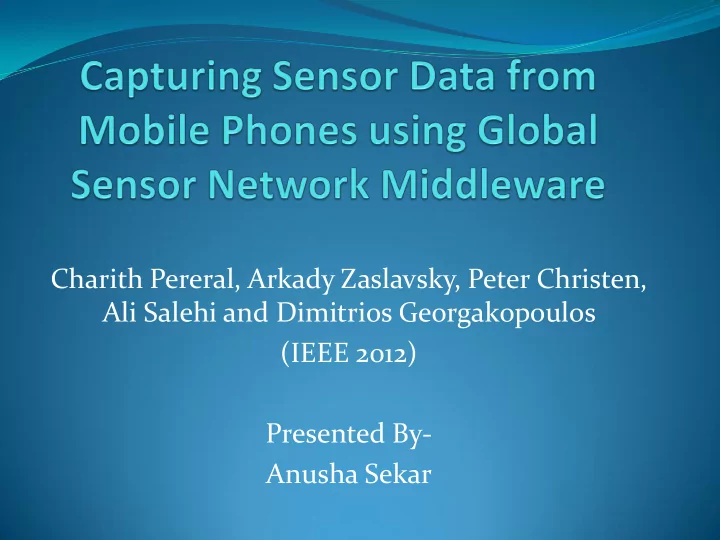

Charith Pereral, Arkady Zaslavsky, Peter Christen, Ali Salehi and Dimitrios Georgakopoulos (IEEE 2012) Presented By- Anusha Sekar
Summary Introduction Terms and Concepts Mobile Sensors Global Sensor Networks DAM4GSN Architecture GSN Wrapper Life Cycle Android Wrappers
Introduction Smart phones use a variety of sensors. DAM4GSN Architecture to capture sensor data using inbuilt sensors. Combine GSN with Android to capture sensor data- achieved using AndroidWrapper. Performance Evaluated based on Power Consumption of device.
Terms and Concepts Sensors Middleware Internet of Things Global Sensor Network DAM4GSN Architecture Wrapper
Mobile Sensors Common Sensors: Motion Sensors- Accelerometer, gravity, linear accelerometer Position Sensors- Orientation, geomagnetic field, proximity Environment Sensors- Light, pressure, humidity, temperature Sensors extended using PAN. PAN connects sensing devices to mobiles. GSN used as data stream processing engine to retrieve data from sensors.
Global Sensor Network GSN- provides middleware to address challenges of sensor data integration and distributed query processing. Design of GSN based on simplicity, adaptivity, scalability, light-weight implementation. Features: Simplifies process of connecting sensor devices to applications Allows to integrate, discover, combine, query and filter sensor data. Virtual Sensor- like a Data producer. Ex: wireless camera, mobiles. Wrapper- Java code that acquires data from a device. Transforms raw data into GSN standard data model. Wrapper classes extend to AbstractWrapper class. GSN provides wrappers for all TinyOS sensors.
DAM4GSN Architecture Server Configuration - Explains how GSN server needs to be configured to collect data Steps- Develop wrapper to retrieve data from mobiles. Define a Virtual Sensor. Virtual Sensor Definition (XML file)- provides information to GSN to create a Virtual Sensor.
Phases of communication- Client sends data to GSN Server. GSN Server configures Wrapper and accepts sensor data. Client sends data to GSN Server according to the frequency set. Generic Wrapper-changes internal data structures to suit sensors.
Client Configuration - Explains how mobile phones need to configured to read sensor data through sensors and send to GSN Server Steps- Identifies the in-built sensors. Sensor enabled if supported by hardware and software. Requires GSN IP address, port number and sensing frequency. User needs to connect device to GSN Server using WiFi or 3G. Connection established based on data sent to GSN Server. Start Sensing.
Data Format - Explains how communication between GSN Server and mobile phone occurs and how data packets are formatted. Data format- Metadata- Establishes connection between GSN Server and mobile. Metadata packet size does not vary from device to device. Sensor Data- generated in the same order as the selected sensors. Sensor data size can be varied from 4 bytes to 108 bytes (max of 27 floating values). Sensor readings from configured sensors appended to data packet.
GSN Wrappers Life Cycle Steps- VSD file defined->virtual sensor creation process begins. Wrapper corresponding to each sensor created by sending a Wrapper Connection request to the wrapper repository. Wrapper Connection Request- object that has wrapper name and initialization parameters. i. Repository looks for instance that matches WCR. If no match, repository creates wrapper object. ii. If no match and no appropriate wrapper, it returns false. iii.
Android Wrapper Wrappers need to extend to gsn.wrapper.AbstractWrapper Methods defined- boolean initialize()- called after creating wrapper object->creates a socket and waits for client to send metadata packet->packet is analyzed and identifies client sensors->sensors sent to createDataCollection() finalize()- called at the end of life cycle to release resources. getWrapperName()- returns name of wrapper. getOutputFormat()- describes data structure produced by wrapper. run()- waits till client sends data->maps received data to GSN data model structure using mapSensordata()->function performed on data.
Advantages Need not install GSN in every device. Need to develop only a single wrapper on server side->Preserves SCALABILITY. Updates need to be done only on client side. Need not change wrapper code as it is generalized for all sensors.
Evaluation Devices used- Samsung Galaxy S and PowerTutor app. From graphs- Network Communication cost is higher than CPU energy cost.
Future Work Automating Wrapper Development Building DAM4GSN architecture into the GSN Middleware. Compressing data while sending over network to GSN Server.
Questions?
Recommend
More recommend